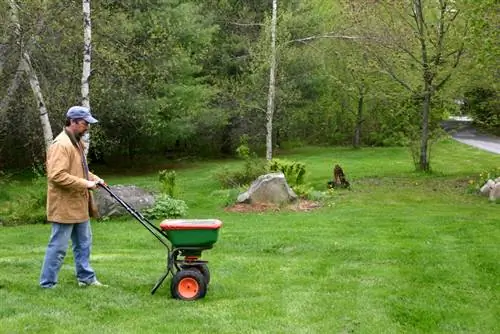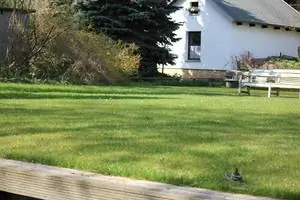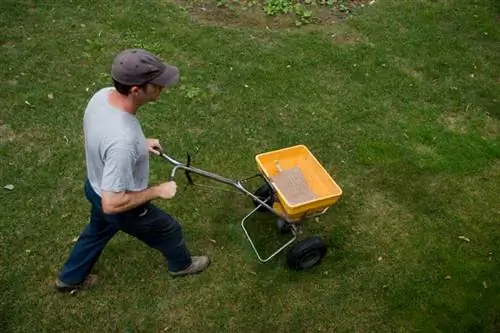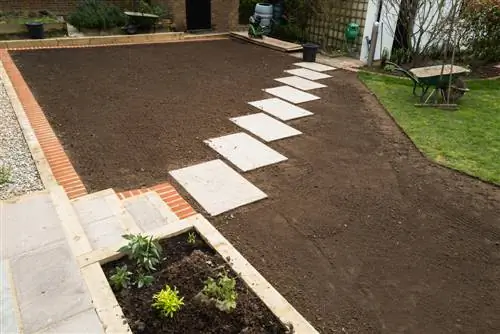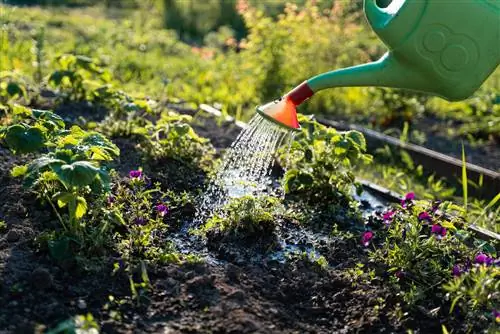- Author admin leonars@hobbygardeners.com.
- Public 2023-12-29 04:51.
- Last modified 2025-01-23 11:20.
Lawns in the garden are naturally considered to be above average, so regular fertilization is a regular mandatory task due to the loss of substance that occurs when mowing. Actually, the nutritional needs of this popular garden green are quite monotonous. Potassium and nitrogen are often enough, but you still need power food in the form of organic and mineral lawn fertilizers, at least two to three times a year. If you fed it in March, it's your turn again in July, because it lasts longer than six months Mineral fertilizer does not work. Organic fertilizer that is applied to the lawn in granules by hand or with a spreader works longer. Although its concentration is weaker, it is not washed out and improves the soil and its ability to retain water beneath the turf for a longer period of time. And the lawn needs strength, especially in summer because it has to use all its energy to fight off the overgrown weeds.
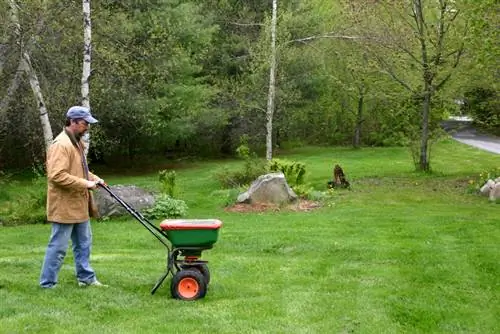
How do you properly care for the lawn in July?
In July, the lawn should be fertilized regularly, preferably with organic or mineral long-term fertilizer. Pay attention to the correct dosage and mow the lawn once a week in the summer months, or even twice a week if mulching.
If you fed with it in March, it's time to do it again in July, because mineral fertilizer doesn't work for longer than six months. Organic fertilizer that is applied to the lawn in granules by hand or with a spreader works longer. Although its concentration is weaker, it is not washed out and improves the soil and its ability to retain water beneath the turf for a longer period of time. And the lawn needs strength, especially in summer because it has to use all its energy to fight off the overgrown weeds.
So if you don't fertilize or fertilize incorrectly, you don't have to be surprised about the extremely annoying lawn weeds. We have already highlighted the differences between the individual types of fertilizer in the previous article on soil care. They also apply to the care of garden greenery. But which of what feels like thousands of different types of lawn fertilizer is really the best? The heimwerker.de portal recently found out for 2017 - here are the recommendations:
| Comparison winner | Price-performance winner | ||||
|---|---|---|---|---|---|
| Brand/Product | Wolf Garden 2 in 1 3840745 | Compo with long-term effects | Neudorff Azet lawn fertilizer | Cuxin DCM Special Minigran | Natures Organic 8864 |
| Comparison result | 1, 3 very good | 1, 4 very good | 1, 5 good | 1, 7 good | 1, 8 good |
| Type of fertilizer | organic-mineral | organic | organic | organic-mineral | organic |
| Season | Spring | Spring | Summer and Autumn | Summer and Autumn | Spring and Summer |
| enough for | 450 m2 | 750 m2 | 200 m2 | 500 m2 | 250 m2 |
| Price/10m2 | approx. 0.67 € | approx. 0.51 € | approx. 1, 10 € | approx. 0.71 € | approx. 1.00 € |
| Nitrogen content | 22 % | 15% | 10% | 12 % | 9 % |
| Phosphate content | 5% | 5% | 3 % | 4 % | 2 % |
| Potassium content | 5% | 8 % | 5% | 6 % | 2 % |
| Weed killer | yes | no | no | no | no |
| organic | no | yes | yes | no | yes |
| Price (approx.) | 39, 95 € at Hertie | 34, €99 at Dehner | 23, 99 € at OBI | 32, 99 € Baumarktplus | 18, 96 € On eBay |
Overfertilizing is more harmful than not doing it at all
Oops - something goes wrong when filling the spreader out of the bag and straight onto the lawn. Or when fertilizing by hand - a little more won't hurt. Wrong, at least with mineral lawn fertilizer, because it should really be applied exactly according to the manufacturer's instructions. To be on the safe side, it is best to fill the spreader at the edge of the lawn. However, the lawn doesn't mind a boost in organic fertilization, as the nutrients are only released gradually and their concentration does not have a damaging effect on plants. Incidentally, the slightly unpleasant smells after pouring disappear after a short time. After fertilizing with organic and high-quality mineral agents that are completely safe for children and pets, the lawn can be walked on straight away. If you use fertilizer with an integrated moss killer, you should leave the green areas completely alone for at least three days.
Tips & Tricks
After fertilizing your lawn during the summer months, you should mow it once a week, or even twice a week if mulched. If possible, not too deep, otherwise the formation of moss and weeds will be accelerated.

